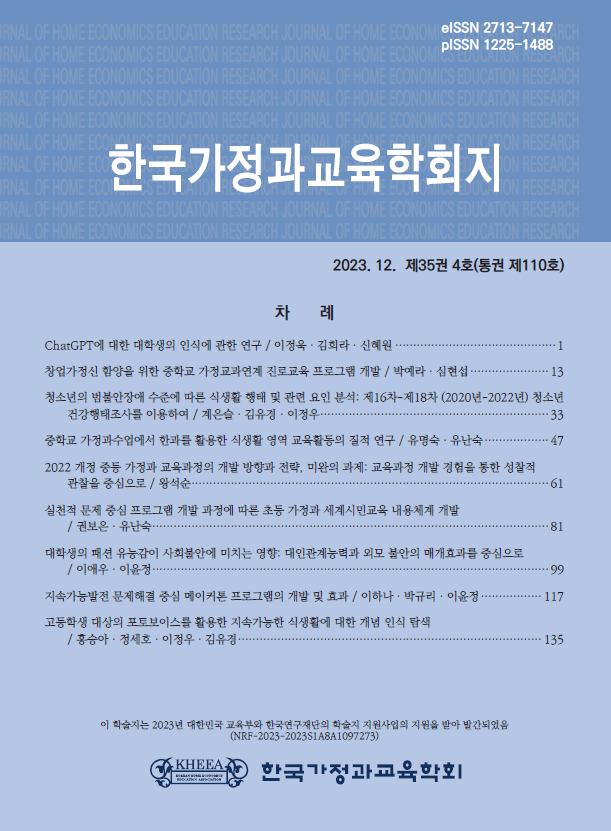중학교 가정과수업에서 한과를 활용한 식생활 영역 교육활동의 질적 연구
Qualitative Study on Educational Activities in the Area of Dietary Life Using Han-gwa in the Middle School Home Economics Class
- 한국가정과교육학회
- 한국가정과교육학회지
- 제35권 제4호
-
2023.1247 - 60 (14 pages)
- 92

본 연구에서는 중학교 가정 교과에서 한과를 활용한 식생활 영역 수업에 대한 학생들의 경험을 살펴보는 데 목적이 있다. 본 연구에서 수집된 참여 관찰, 심층 면담, 현장 자료 등은 에믹 코딩으로 분석되었으며, 그 결과는 다음과 같다. 첫째, 학생들은 ‘한과 실습에 대한 기대감’을 가지고 있었다. 학생들은 실습에 대해 항상 긍정적이며, 맛있는 것을 먹는다는 기대감과 중학교에 들어와 처음 하는 실습에 대해 무척이나 기다리고 있다는 것을 알 수 있었다. 또한 한과를 처음 접해보는 학생들이 많이 있어 한과에 대해 알아보는 것에 대한 기대감도 높았다. 둘째, 학생들은 ‘한과 프로젝트를 통한 주도적인 학습 과정’을 경험하였다. 즉, 학생들은 한과에 대한 활동북을 만드는 과정에서 한과와 양과의 차이, 한과 조리의 과학적 원리 등에 대하여 자기주도적인 학습이 일어남을 깨달았다. 셋째, 학생들은 ‘실습을 통한 한과의 자긍심’을 가지고 있었다. 학생들은 한과에 대해 소중히 여기고 전통을 계승해야겠다는 충분한 인식과 가치변화가 있었다는 것을 알게 되었다. 넷째, ‘잠재적 교육과정 효과’가 있었다. 중학교 3년 내내 코로나를 겪으면서 대면 모둠활동을 경험하지 못했던 학생들이 협력의 중요성을 인식하게 되었고, 가정에서도 한과를 직접 만들어보기도 하였다. 학생들이 전통한과에 대한 자긍심을 갖게 하기 위해서는 학교 현장에서 가정과교사가 적극적으로 전통 식품에 대한 수업을 진행하여 학생들에게 접할 수 있는 기회를 많이 제공하는 것이 필요하다는 것이 확인되었다.
The purpose of this study was to examine students' experiences in the dietary life class using traditional Korean desserts in middle school home economics classes. Participatory observation, in-depth interview, and site data collected in this study were analyzed through emic coding, and the results are as follows. First, students had ‘expectations about Han-gwa lab classes.’ Students were always positive about lab classes, looking forward to eating delicious food and eagerly awaiting their first lab class since entering middle school. Additionally, there were many students who were experiencing Han-gwa for the first time, so expectations about learning about Han-gwa were high. Second, students engaged in ‘self-directed learning through the Han-gwa project.’ In other words, while creating an activity book about Han-gwa, the students realized self-directed learning about the differences between Han-gwa and Yang-gwa (Western-style sweets), and the scientific principles of cooking Han-gwa. Third, students had ‘instilled pride in Han-gwa through lab classes.’ The students learned that there was sufficient awareness and change in values to cherish Han-gwa and to inherit its traditions. Fourth, there was a ‘potential curriculum effect.’ Students who did not experience face-to-face group activities for three years in middle school due to COVID-19 came to recognize the importance of collaboration and even tried making Han-gwa at home. In order for students to have pride in Han-gwa, it was confirmed that it was necessary for home economics teachers at school to actively teach classes on traditional foods and provide students with many opportunities to encounter them.
Ⅰ. 서론
Ⅱ. 이론적 배경
Ⅲ. 연구 방법
Ⅳ. 연구 결과
Ⅴ. 요약 및 논의
(0)
(0)